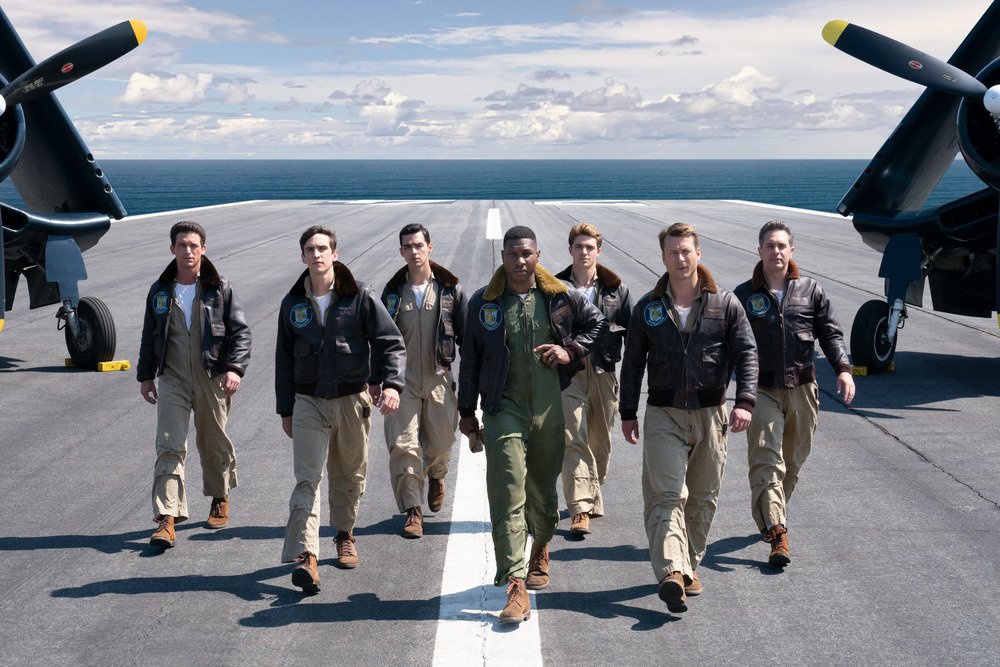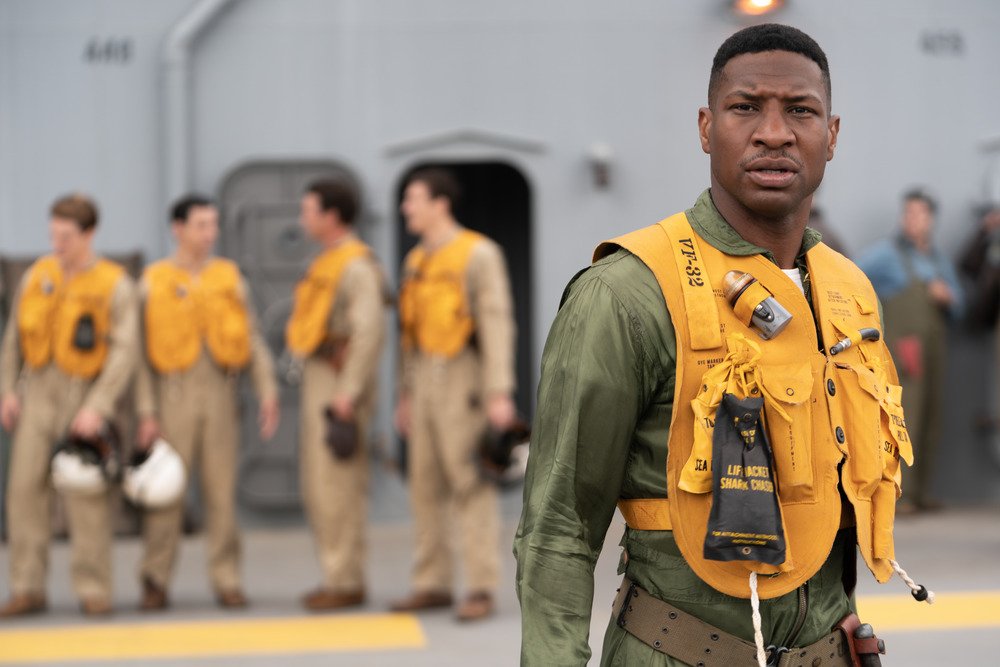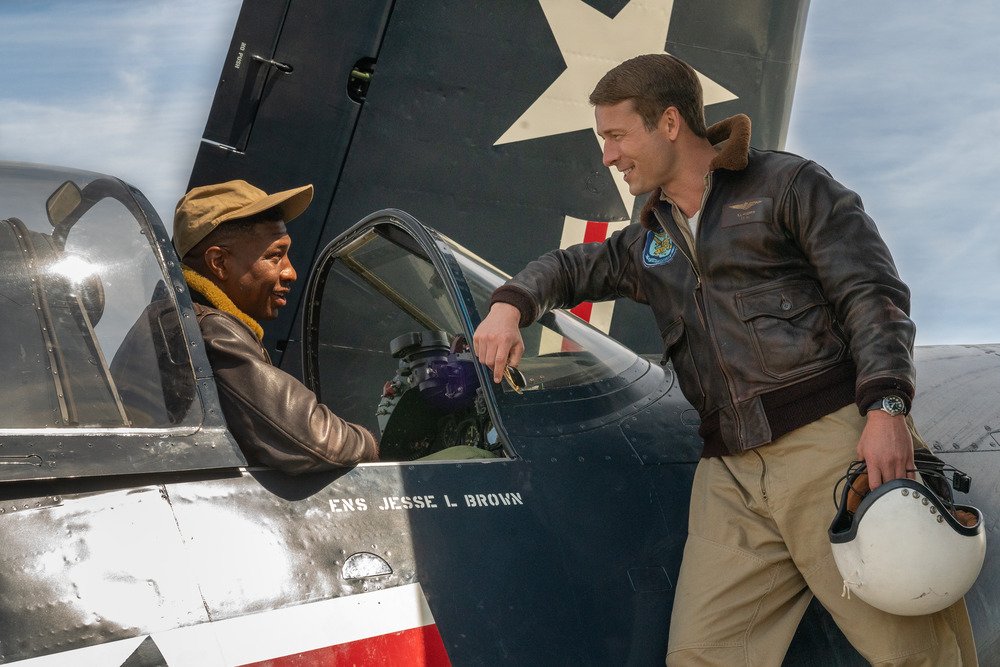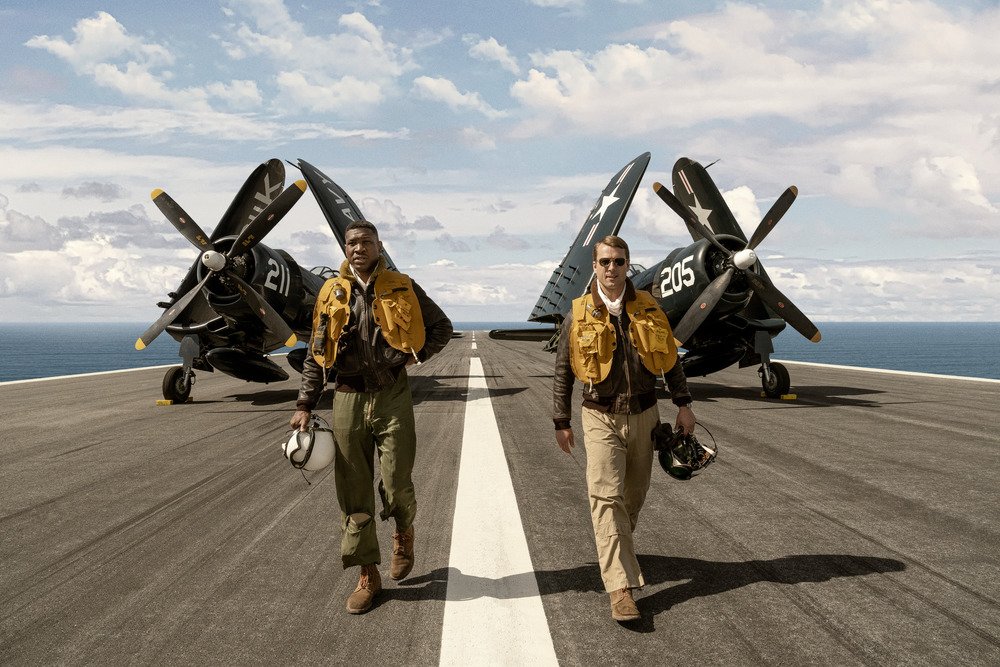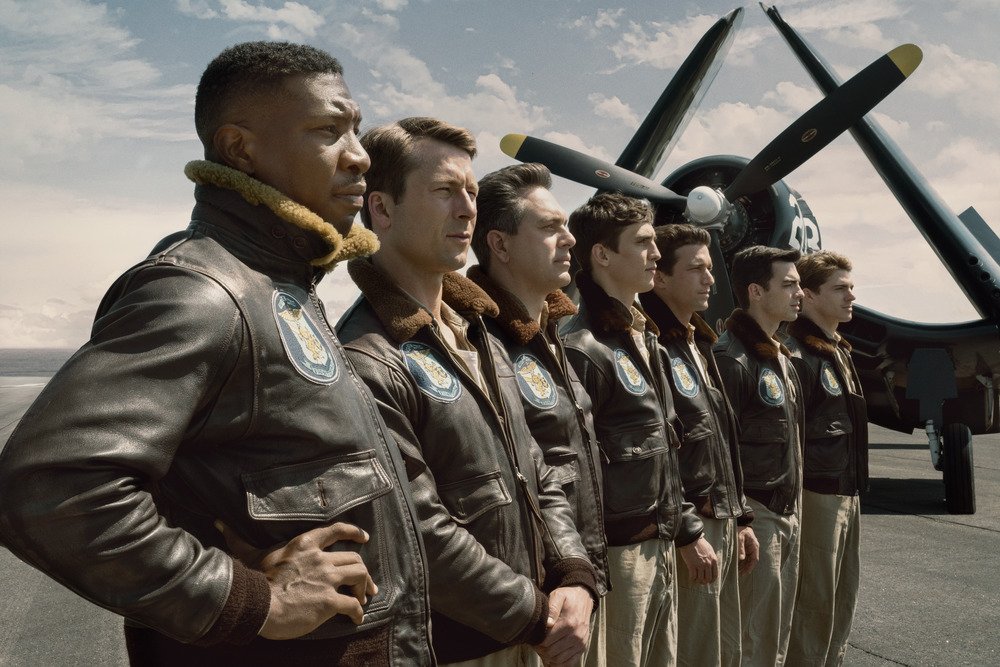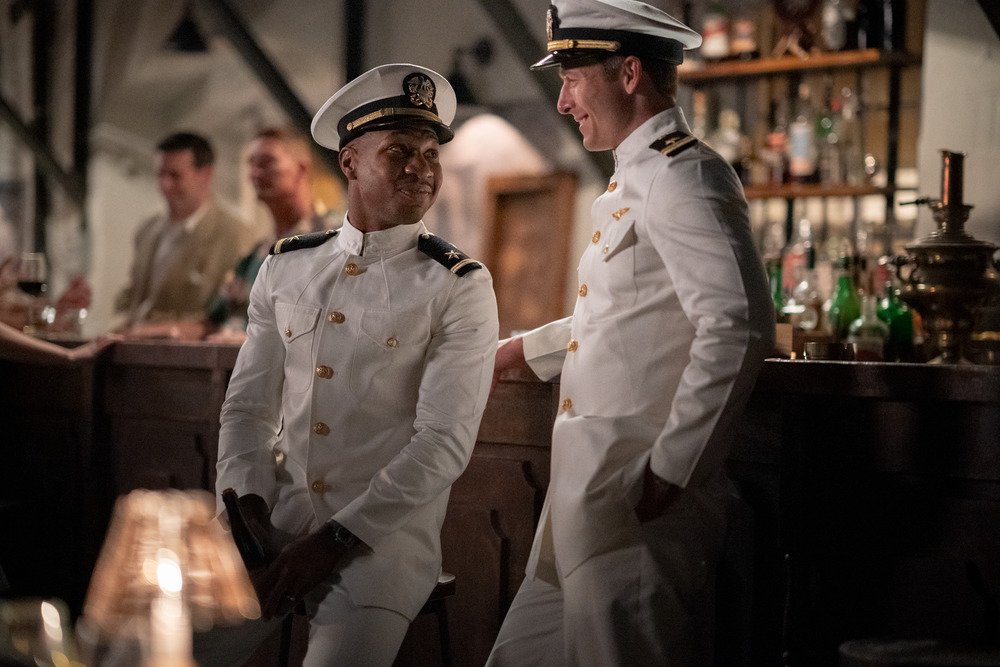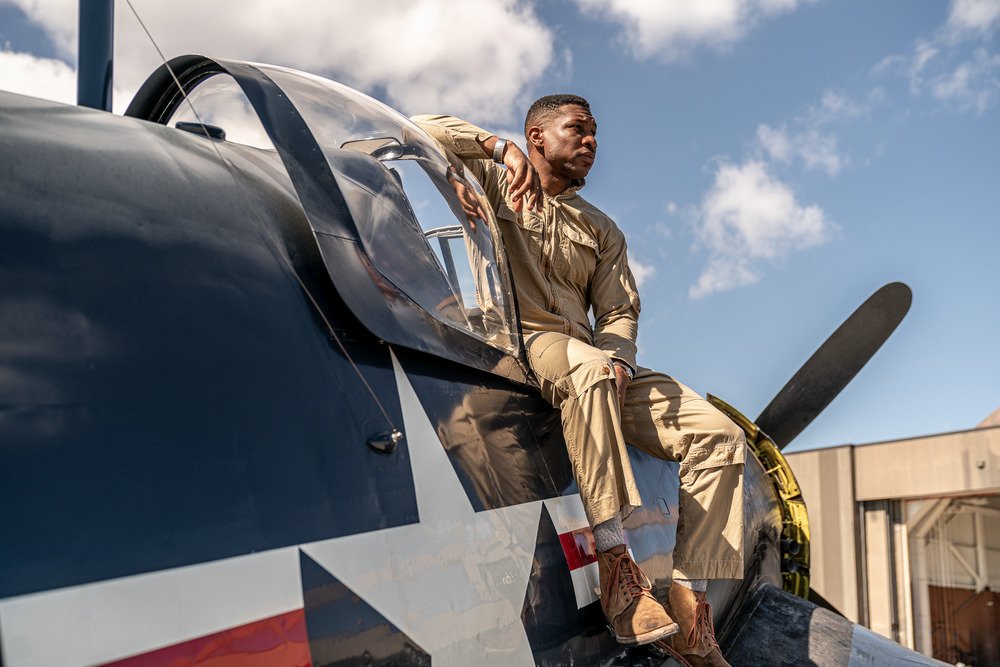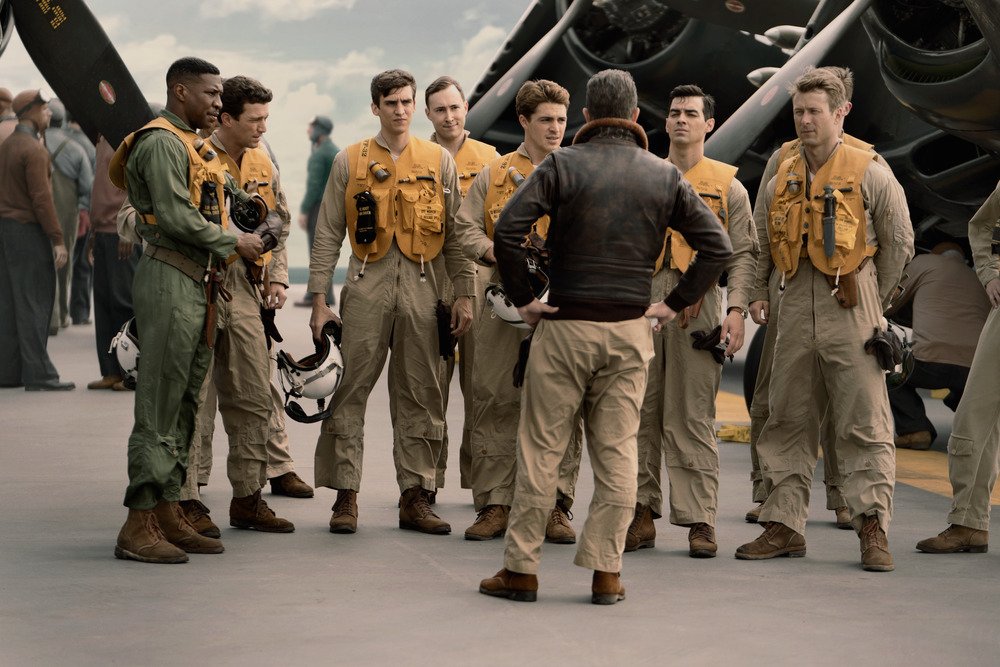MOVIE REVIEW: Devotion
Special presentation of the 58th Chicago International Film Festival
DEVOTION– 4 STARS
There’s an aside early in Devotion where Jonathan Majors is looking straight-on into the camera in the position of a locker room mirror. He’s voicing racial epithets at himself that he’s logged over the years in a small journal. Each one he utters gets a harsher than the last one while the camera loosens slowly wider. The exercise psyches up his courage and heats up his blood, and it’s an activity he will repeat later in the film. Yet, the old words still hurt.
This face of internal conflict belongs to Ensign Jesse L. Brown. He is credited as the first Black aviator in the United States Navy. Every step taken to get to this point was never easy. As this preflight moment peaks, the man squeezes tears, wipes them away, and sucks up any visible weakness. His fire to fly has been lit. Jesse adjusts his uniform, steps out of that room, and walks onto a runway with a different cock of the walk gait of temerity than his white pilot peers.
LESSON #1: THE STORY OF JESSE BROWN– This private moment that thrusts this individual into his work tells you what kind of man Jesse Brown was and what kind of story Devotion ardently celebrates. Less a traditional biopic and honed more as a war drama of preparation and brotherhood, Sleight director J.D. Dillard composes a cinematic testament shaped by the pillars of its chosen title more than boilerplate patriotism. Devotion immediately earns its place in a history teacher’s film library as a companion to its Adam Makos source novel from 2015.
Devotion opens in 1950 where Lt. Tom Hudner, played by Glen Powell of Top Gun: Maverick and Everybody Wants Some!!, arrives at Naval Air Station Quonset Point in Rhode Island for his latest assignment. Serving under the curt commanding officer Dick Cevoli (The Newsroom’s Thomas Sadoski, in a choice part), the clean-cut Naval Academy grad joins an elite collection of pilots training for combat that may never come in the post-war years. Jesse Brown is the stoic outsider among the more garrulous collection of low-key glory hounds played by the ensemble of Grammy-nominated frontman Joe Jonas, Daren Kagasoff of The Secret Life of an American Teenager, Ozark’s Spencer Neville, Nick Hargrove of Charmed, and others.
LESSON #2: TESTING YOUR PARTNER– When Hudner is paired as a wingman with Brown, the very civil lieutenant with a “hell of a pretty face” tries to build a partner’s relationship. Brown’s response to that initially is to test the flyboy skills and, more importantly, his personal mettle by putting Tom through the aerial paces of the Rhode Island coastline. Brown offers a great line of reasoning of, “Put him in a little trouble and find out who he really is.” Understandably so, he’s seen too many tough-talking adversaries masked as teammates. Only when Hudner showed fair and equal standards (echoed by Sadowski’s cool cat Cevoli), did Jesse let his guard down and open himself to Tom’s camaraderie.
As Tom learns, unlike many single skirt-chasers in uniform, the Jesse Brown on the ground is a married man and young father to a toddler daughter. His strong and loyal wife Daisy, played by The Night House’s Christina Jackson, keeps the man in order through affection, promises, and faith. With cinematic shorthand and lovely “yes, ma’am” chemistry between Majors and Jackson, Devotion paints a connection of shared hardship and beautiful healing between the two. In the simplest heroic fashion, we see what Brown is fighting for is greater than his own journey to become a decorated pilot. Earning the Brown family’s trust, Hudner is now linked to those very same promises.
Lo and behold, the Second Red Scare and invasive activities overseas launch the United States into the Korean War. Cevoli begins training the team for aircraft carrier operations using new F4U Corsairs that are more powerful and more challenging to control than their World War II-era predecessors. Working aboard the U.S.S. Leyte, the squadron begins maneuvers in the Mediterranean before embarking to the Asian battlegrounds in the Pacific. Devotion’s aerial work, orchestrated by stunt coordinator/second unit director Keith Woulard (The Harder They Fall) and the father-and-son aerial coordinator team of Kevin LaRosa Sr. and Kevin LaRosa Jr., shines from there for the requisite combat spectacle.
LESSON #3: THE MANY CONNOTATIONS OF DEVOTION– Throughout Devotion, many connotations of the titular trait meld within the characters and their wartime situation. In addition to the family layer, trust instincts, and aim of personal improvement highlighted earlier, Jesse also carries a soldier’s typical devotion to country, duty, tactics, teamwork, and the men next to him. From the Black enlisted peers working in the kitchen and engine bowels of the ship to his own tight-knit pilot brothers, Jesse’s accomplishments give people pauses of stolid respect, paying their own devotion back to him.
The solid foundation of these dynamics is built by rising stars Jonathan Majors and Glen Powell putting the appropriate seriousness and reverence first. Majors plays Brown with heavy fortitude with the right amount of paternal and brotherly heart. In each moment of bravery, he is easy to admire. For anyone who’s seen Powell’s loquacious roles in other films, his firehouse of charisma could have drenched this picture in machismo. Instead, he too stays on message as an ideal dramatic ally and advocate to his fellow sailor.
Arguably the best artistic quality about Devotion is its calculated temperance that matches the reserve of the two main characters. This isn’t about medals, ticker-tape parades, or blazes of glory. Composer and violinist Chandra Dancy (Aftershock) creates musical motifs that exude equal parts of calm strength and pressured nerves without overwrought bombast and oo-rah pom-poms. Up and coming cinematographer Eric Messerschmidt, an Oscar winner for Mank, glides along the shimmering fuselages of the blended aerial footage and VFX to frame and light the moments less so than the superstar men. Likewise, editor Billy Fox (Straight Outta Compton) never over-chops the kinetic scenes into frenetic messes.
Without question, Devotion is still a movie that paints its own brushstrokes of history and fills in cracks for engagement. The real story, especially in a case like this, will always be larger than the movie. Look no further than the official citation that accompanied Jesse Brown’s awarding of the Distinguished Flying Cross. In different hands, Devotion would be a Michael Bay fireworks show of grandiose noise. Director J.D. Dillard proves a story of proper hero worship can reach rousing and patriotic heights without screaming to high heaven. Once again, look no further than that perfect title and what it stands for in all its places.
LOGO DESIGNED BY MEENTS ILLUSTRATED (#1079)



